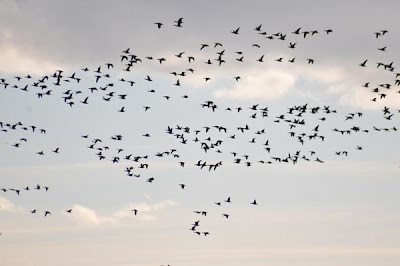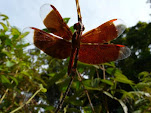A rather Turner-esque sunset over Wicken Fen.
A bright and bitter morning dawned on us unsuspecting Devonians, as we circumnavigated the horrendous Cambridge traffic and headed off across the unremittingly flat Cambridgeshire countryside to Welney WWT. Clear skies meant that the temperature had dropped off strongly, so most of the little water present on the floodplain was frozen solid. A mass of Whooper Swans were feeding intently on food left out for them in front of the main hide, along with a handful of Greylags. A nicely mixed bag of ducks - Mallard, Teal, Wigeon, Pochard and Shoveler were loafing and preening in front of the hide, whilst a host of Wigeon grazed the banks on the far side of the floodplain. Lapwing were scattered across the grassland, looking miserably cold...
The Ouse Washes - mainly frozen but very beautiful
Whooper Swans make sure to keep the Greylags at bay as they feed
We finally returned to the cafe, had a cup of tea and admired the feeding frenzy of Collared Doves, Jackdaws, Greenfinches and House Sparrows on the feeders outside, with a handful of Tree Sparrows mixed in. Time to move on, after scanning quickly through the flocks of swans on the neighbouring fields, just to have a look at some Bewick's Swans amongst the Whoopers - not so easy to pick up quickly when everyone's up to their nostrils in mud! Fortunately the size difference helps.
Whooper and Bewick's Swans on the fields near Welney
A brief covey of Grey Partridge later (whatever happened to those in Devon?!) we continued on to Norfolk - a marginally less flat county than Cambs. As we were on holiday, we took the scenic route through the back-roads, rather than mingling with everyone else on the A149. Half-way to Holkham we happened upon a flock of some 3,000 Pink-footed Geese, which gave us the perfect opportunity to hold up, have lunch and enjoy the sounds of the flock squeaking and squabbling.
Pink-footed Geese in the Norfolk hinterlands
On we drove, towards a blank wall of dark sky - which eventually dumped a couple of inches of snow on us over the next 20 minutes. We carefully navigated our way through to Holkham, thanking everything possible that we'd chosen to take the quiet roads, coughed up £2 for parking and went off for another wander, admired the sunset and finally booked in to our B&B (Arch House; very comfy, and a superb cooked breakfast - can thoroughly recommend).
Sunset looking from Holkham Gap towards Burnham Overy and Scolt Head
Saturday morning saw us up bright and early, and walking out into the teeth of an inordinately stiff northerly wind. The birds were - unsurprisingly, but disappointingly - completely blown out. Several disconsolate-looking Lapwing were huddled on the local pitch-and-putt golf course, apparently waiting for the weather to ease. A handful of Sanderling scurried around on the beach, along with a few Turnstone as we struggled along from Wells to Holkham - the happiest-looking group were gorging on the remains of a small dogfish. We pottered along steadily, and finally swung into the dunes at Holkham Gap, where we erected the tripod, poured some soup and waited for the local group of Shorelarks to emerge. Despite a nice flock of Skylark and Linnet showing well, we lost out on the Shorelarks, due in large part to the behaviour of the other people looking for them: one group in particular stringing out into a line and walking the saltmarsh in order to flush the birds. Hardly fair on the birds in sub-zero temperatures and force 6 winds.
We gave up rapidly, rather than join in the 'fun', and went to look across the marsh which lies inland of the pine-tree belt. We quickly found a superb Rough-legged Buzzard, which kept us occupied for a while and made Na's several-hundredth new bird seen this year. The marshes were pickled with Wigeon, Teal and Mallard, and a fine drake Goldeneye was lurking on a small pool on the edge of the trees, but there was little else to distract us, so we continued along the coast to Cley-next-the-sea and the famous Cley Marshes.
Looking from Cley to Blakeney, along the shingle beach. A stiff northerly wind made it tough to see what might be on the sea, not to mention the shivers at the thought of being out on that 'orrible North Sea chop.
The wind hadn't abated in the slightest, so we were rather limited - a stroll along the beach, dropping in to the North Scrape hide along the way. Since the Environment Agency finally decided that an annual bulldozer-fest to maintain an artificially high shingle ridge was no longer economic, the ridge has become far more natural-looking, with some superb washover fans, and the marsh behind has now become slightly more saline, by the look of it. A sprinkling of Wigeon and Teal on the scrape hid a couple of Shoveler and Gadwall, with three Avocet snoozing regally behind them.
Brent Geese over Cley Marshes - whilst we admired the North Norfolk coastal marshes and huddled out of the freezing wind as best we could, the Brents got up from the west and headed east - just like us...
Brent Geese
Little Egret. Superbly camouflaged amongst the snow, when it comes.
Cley, looking west along the shingle ridge. Smashing washover fans of shingle now that the bank is no longer maintained by force. Looking towards the North Scrape hide.
Our final full day in Norfolk was characterised by an absolute lack of photos. After a late start and a leisurely cooked breakfast in the local greasy spoon, we headed for a walk round Roydon Common in the west of the county. The skies grew steadily darker as we drove, and by the time we arrived it was positively crepuscular. Despite that we had a pleasant walk, seeing such delights as Fallow Deer, Common Buzzard (relatively rare out there!) and Tree Sparrow, but nary a glimmer of light worth photography...
We left Norwich - finally - after an abortive attempt to see Waxwings and stopped for a quick wander around Thetford Forest. We took a short walk to freshen the cobwebs out of our lungs, but with snow falling more and more heavily, it felt like a good time to head west, like Drake, for the relative comfort and security of sub-zero Devon.
Snowfall in Thetford Forest
















No comments:
Post a Comment